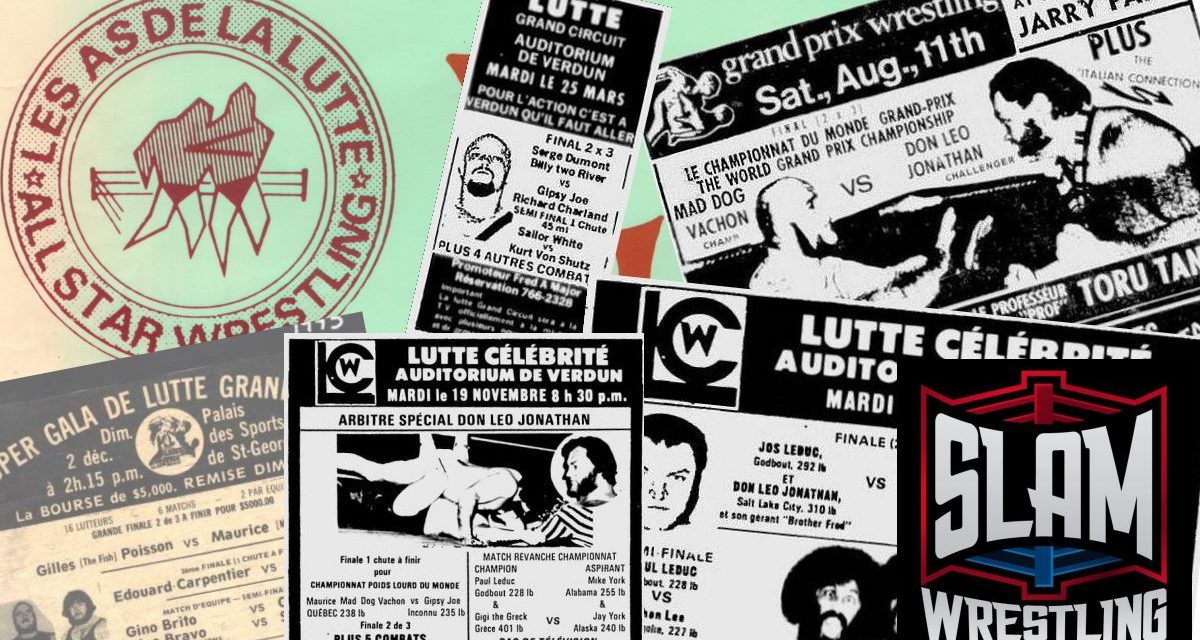Gilles “The Fish” Poisson had a professional wrestling career that would make many people envious. He wrestled several times in Japan, he worked with Jean Ferré (Andre the Giant) when Andre was starting in the business, he had the chance to wrestle in two different golden age eras of Quebec wrestling and worked for all the big U.S. wrestling promotions like AWA, NWA and WWWF.
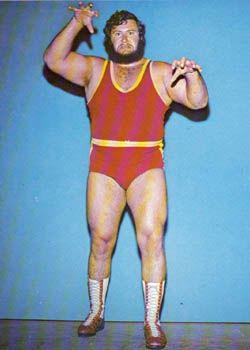
Gilles “The Fish” Poisson in a 1973 publicity photo for Montreal’s Grand Prix Wrestling.
As a kid, Poisson loved watching Killer Kowalski on TV. “I always liked the bad guys,” said Poisson, who mainly wrestled as a heel. “It’s funny because years later I was teaming with him.”
Like many, Poisson started as an amateur wrestler. “I almost made it to the ’68 Olympics but was cut because of an injury,” recalled Poisson. “I was doing amateur wrestling only to become one day pro wrestler.”
After being trained as a professional, he was sent to Stampede Wrestling in Calgary by Maurice “Mad Dog” Vachon. Both brothers, Maurice and Paul, are well known and respected in the province of Quebec for helping local guys getting a break in the business. He actually had his first pro wrestling match for Stampede, where he stayed several months, working as Pierre LeGrand. He fought the likes of “The Stomper” Archie Gouldie and Abdullah the Butcher.
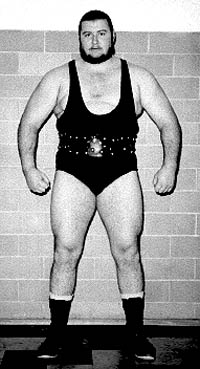
As Pierre LeGrand in Stampede Wrestling. Photo by Bob Leonard
Following his time in Stampede, he went to Don Owen’s territory in Portland and from there to Giant Baba’s All-Japan Pro Wrestling. “In Japan, I was working under a mask and I was dubbed ‘The Canadian,'” said Poisson. Throughout his career, he went to Japan four or five times, working for both Baba’s and Inoki’s promotions.
By the time he finally made his way back to Quebec, he’d already been in professional wrestling for two years.
“When I came back, Grand Prix Wrestling was starting and Mad Dog Vachon brought me in,” he explained.
The goal was to build him into a foe for Jean Ferré, the future Andre the Giant, who had just started with Grand Prix Wrestling in 1972.
“We had Gilles ‘The Fish’ Poisson on television every week wrestling against not one but two opponents at a time and overpowering them both, like the Giant did. We had been doing that for quite awhile when finally we put it into the ballpark show as an extra attraction. The Giant against the giant killer, Gilles ‘The Fish’ Poisson,” wrote Paul “The Butcher” Vachon in his third autobiography, When Wrestling Was Real III: The Rise and Fall of Montreal’s Grand Prix Wrestling.
“It was hard working with such a tall guy,” remembered Poisson. In July 1973, at Montreal’s Jarry Park stadium in front of 29,000 people, he was scheduled to wrestle against Andre, but the Athletic Commission didn’t let Andre wrestle because his wrestling permit had expired. But it didn’t really bother Poisson. “I wrestled Andre hundreds of times. I was in fact one of the few who bodyslammed Andre.” In Grand Prix, he wrestled mainly in tag team competitions, with many different partners, including Zarinoff Leboeuf, Tarzan “The Boot” Tyler and Killer Kowalski.
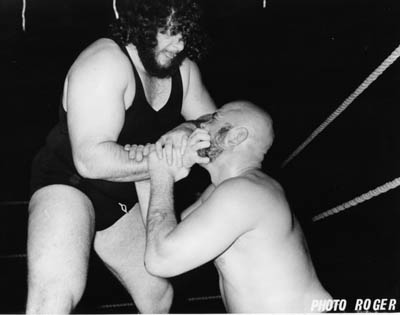
Poisson manhandles Paul Leduc in 1972. Photo by Roger Arpin.
He started using the name Gilles “The Fish” Poisson in Grand Prix, with “Poisson” the French word for “Fish.” An interesting note is that “The Fish” was born Gilles Poisson and not Charles Berger like many websites state. “I’m aware of that, but I really don’t know where it comes from,” he said. “I had the best name to work in Quebec.”
In 1976, after Grand Prix had closed, he was invited to go and work for Vince McMahon Sr.’s WWWF in New York City. The office there changed his name to Louis Cyr, which was the name of the most famous strongman in Quebec history. “I was known all over the province as the ‘Lac St-Jean’s Strongman,'” said the native of Jonquière, a town 200 km north of Quebec City. It wasn’t just lip service to an old strongman legend; Poisson lifted a car on TV in the 1970s — “The car weighted 2200 pounds,” swore Poisson.
In WWWF, he worked with names like Crusher Blackwell, Bobo Brazil, Tony Parisi, Dominic Denucci and Louis Cerdan (Gino Brito). Even though he fought with a lot of so-called “The Italian Connection,” the traditional stepping stones up the ladder, he never wrestled Bruno Sammartino, the big star of the promotion at the time. “I was supposed to have a program with him, but politics got involved and somebody else took my spot,” said Poisson. Soon after, he left WWWF after being there for only a few months.
He then went to Minneapolis, for Verne Gagne’s AWA, this time under the name of Pierre Poisson. “Gilles is not a name that English spoken people can pronounce very well, so Verne changed it for Pierre.” He wasn’t there for very long, but worked with wrestlers such as Baron Von Rashke, Pedro Morales and The Vachons.
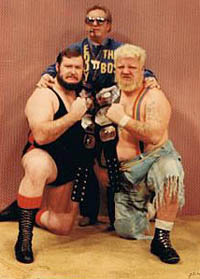
Poisson, manager Eddie Creetchman and Sailor White in International Wrestling.
Then came the 1980s and Gino Brito’s International Wrestling. Again, Poisson mostly worked in tag team with Serge Dumont and Sailor White to name a couple. At the same time, he was promoting for International Wrestling in some Quebec regions like Beauce and the Bois-Francs.
“I had opened a business and wrestling wasn’t my priority anymore,” explained Poisson. He was out of the business, retired, by the mid-’80s.
While it is well known that Poisson wrestled in Calgary, Portland, Japan, Montréal, for Grand Prix and International Wrestling, as well as WWWF and AWA, some other territories he worked for were not well documented. “I wrestled in Texas, Louisiana, Hawaii, Maritimes… Germany, France, Belgium, South Africa,” clarified Poisson. “There are so many places we wrestled that were not well documented. While driving to a territory, we could stop in a few cities, stay there for a few days, wrestle and go back on the road.”
When he thinks about his career, he remembers making the most money in New York and Japan. But wrestling in Quebec was special for Poisson. “My best time was in Grand Prix Wrestling. We were wrestling all over Quebec and it was in front of our fans.” Now in his sixties, he’s still in good shape and trains at jujitsu with his son. “I’ve been working out for 50 years,” concluded Poisson proudly.
